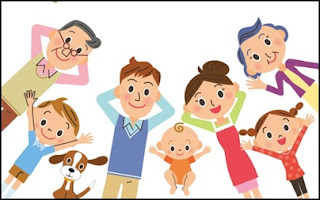一 One :我的家庭 My Family
家庭是我們成長的地方. 家人照顧我們, 滿足我們日常生活的需要, 並教導我們做人做事的道理. 家人間也要互相觀壞, 並珍惜彼此相處的時光. Our family is the place where we all grow up. Our family takes care of us and fulfills our daily needs. Our family teaches us how to be good people and do good things. Family members should care about each other, and treasure the time they spend together.
第一課 Lesson One: 我們的姓名 Our Names
姓名的功用 The Uses of Names
姓名是我們的代表, 有了姓名, 才可以讓別人知道如何稱呼我們. Our name represents us. When we have a name, people know what to call us.
姓名的來源與意義 The Origin and Meaning of Names
姓名可以分為 "姓" 和 "名字". "姓" 是依據父母的性, "名字" 則是父母或長輩仔細考慮以後, 為孩子取的. 取名字的方法有很多種, 有的根據家人的期望, 有的考慮性別不同等等. 每個名字都有它的意義. Names can be divided into "family names" and "given names." A "family name" is taken from one's parents, and a "given name" is chosen for a child by his or her parents and extended family after careful consideration. There are many ways of choosing a name. Some names reflect a family's expectations, while others have to do with sexual differences. Every name has its own meaning.
原住民的命名方式和漢人不同, 有的原住民族並沒有性, 而是沿用長輩的名字; 有的依照族中勇士或擅長織布者的名字為孩子命名. The way in which aboriginal people choose names is different from Chinese people. Some tribes do not use family names, bur rather pass given names on from extended family members. The members of some tribes take their names from honored warriors or weavers.*
不論是用甚麼方法取的名字, 都含有家人對我們的期待和祝福, 期待我們長大成為有用的人, 祝福我們能平安快樂的成長. No matter how a name was chosen, all names represent the hopes and dreams of our family members, and represent the wish that we grow up to be healthy and productive people.
所以, 要珍惜自己的性名, 也要尊重別人的姓名. For this reason you should treasure your name, and respect the names of others.
第二課 Lesson Two: 家庭的生活 Family Life
家庭的照顧與關壞 Care and Concern for One's Family
家庭是我們成長的地方. 家人辛苦照顧我們的飲食起居, 送我們到學校讀書; 當我們生病時, 帶我們去看醫生, 用心照顧. 在家人的細心的愛護下, 我們才能平安長大. Our family is where we grow up. Our family members work hard to provide us with food and shelter, and they take us to school to study. When we are sick they take us to see the doctor, and they nurse us back to health. We can only grow up safely under our family's loving care.
快樂時, 我們可以和家人一起分享喜悅. 悲傷時, 也能夠獲得家人的安慰和鼓勵. When we are happy, we can share our happiness with family members. When we are hurt, we can also receive their consolation and encouragement.
家庭的教育 Family Education
從小家人就教導我們養成良好的生活習慣, 並學習做人做事的道理, 期待我們成為懂事的孩子. From a young age our family members try to teach us how to cultivate good habits, and how to be the good type of person that understanding children grow up to be.
在家中, 我們除了接受家人的教導之外, 也要和家人共同分擔家務, 為家庭盡一份心力. At home, aside from instruction we receive from our family members, we can also do our share of the housework, and put forth more effort for the family.
家庭的收入與支出 A Family's Income and Expenses
家人要工作賺錢, 才能讓家庭有收入. 而家庭生活中的食, 衣, 住, 行, 育, 樂, 樣樣都需要花費, 這些花費要靠家庭的收入來支付. 所以, 我們要學習善用這些收入, 節省不必要的支出, 並且養成儲蓄的習慣. Family members must work to earn money so that the family can have income. Providing the family with food, clothes, a home, travel, education, entertainment and other things costs money, and a family must pay for these things from its income. For this reason we should learn how to use our money wisely, avoid unnecessary expenses, and encourage the habit of saving money.
儲蓄的好處 The Value of Saving Money
儲蓄的好處有很多, 例如: 當家人生病住院急需用錢時, 便可以利用儲蓄的存款來支付. 如果我們想要購買價格較高的物品時, 也可以透過儲蓄的方式來累積金錢. There are many advantages to saving money, for example: when a family member is hospitalized and needs money in an emergency, you can use the money saved to pay the required sum. When we want to buy goods of higher quality, we can also use our savings to pay the extra money such goods will require.
保護自己的方法 How to Protect Yourself
在家庭中, 我們接受家人的照顧與保護, 但是如果有人以暴力的方式傷害我們, 侵犯我們的身體, 或是剝奪我們受教育的權利時, 可以勇敢告訴師長, 或撥打 "113全國婦幼保護專線", 尋求他人的協助. In a family we receive the care and protection of our family members. But if people use violence to hurt us, violate our bodies, or impinge upon our right to an education, it's ok to (bravely) tell your teacher, or call the "113 National Women's and Children's Protection Line" to ask for others' assistance.
*This said, of course it's 2018 and members of various tribes wouldn't be able to function in modern Taiwanese society without a fixed Chinese name. For this reason most aboriginal kids have TWO names, their Chinese name and their tribal name.
The "weavers" reference in the above paragraph might strike some Western readers as strange, but many tribes have important traditions with regard to making cloth.




No comments:
Post a Comment